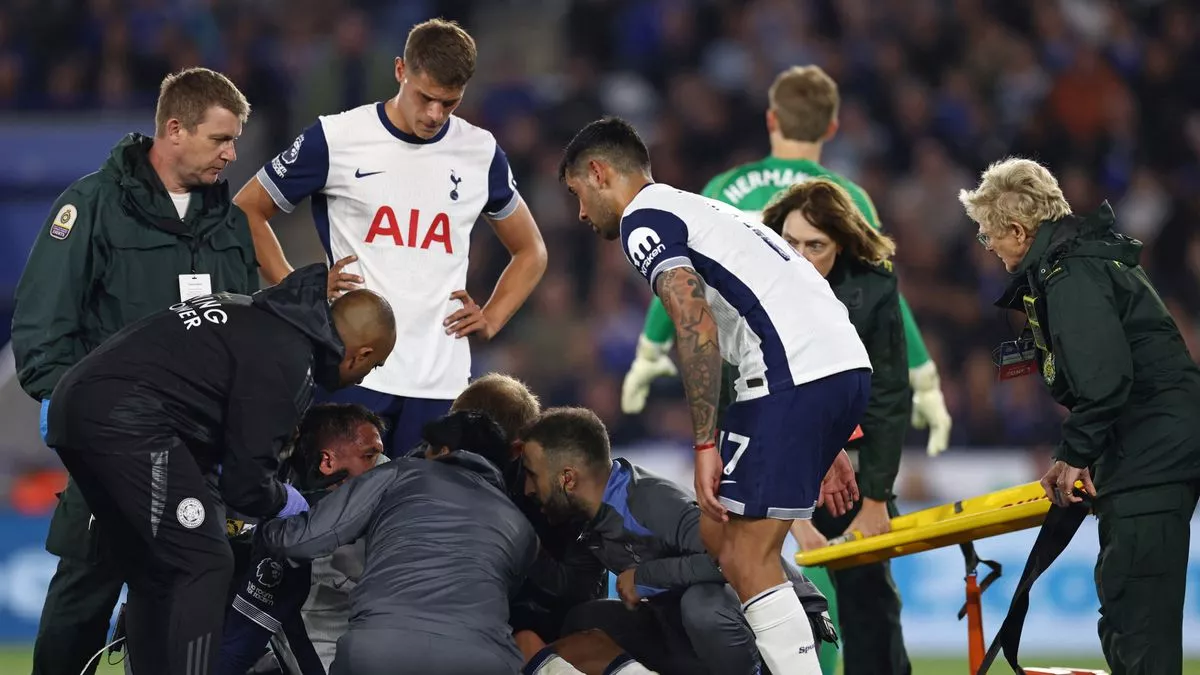
Tottenham Hotspur manager Ange Postecoglou made six substitutions during their 1-1 draw with Leicester City on Monday night, utilizing the recent rule changes introduced by the International Football Association Board (IFAB) regarding concussion protocols.
These rule changes allow for an additional substitution if a player suffers a head injury and exhibits symptoms of a concussion, an adaptation that reflects the growing awareness of the need to protect players from potential long-term neurological damage.
Typically, Premier League teams are allowed to make five substitutions during a match. However, in a bid to enhance player safety, the Premier League adopted the IFAB-recommended rules on concussion substitutions several years ago. This allows clubs to make up to two additional substitutions if a player is suspected of having a concussion, ensuring that teams do not suffer a numerical disadvantage on the field while prioritizing the well-being of their players.
During the match at the King Power Stadium, Postecoglou sought to make full use of this rule. In the final moments of the game, with Tottenham searching for a late winner, the Australian manager made a double substitution in stoppage time, bringing on Richarlison for Son Heung-Min and Djed Spence for Pedro Porro. These changes took Tottenham’s total number of substitutions to six, with the extra substitution being permitted under the concussion protocol.
The key moment that allowed Tottenham to make the additional substitution occurred in the 70th minute when midfielder Rodrigo Bentancur was involved in a clash of heads with Leicester’s Abdul Fatawu during an aerial challenge from a corner. The collision left Bentancur dazed and in need of medical attention on the pitch. After receiving oxygen and being assessed by Tottenham’s medical team, it was determined that he could not continue, leading to his substitution. The Uruguayan was replaced by young midfielder Archie Gray, who was making his debut for Tottenham following his summer transfer from Leeds United.
This incident highlighted the importance of the concussion protocol, as Bentancur’s removal from the game was a precautionary measure to prevent further injury. The protocol not only safeguards the health of players but also ensures that teams can continue to compete on an even playing field. Had the rule not been in place, Tottenham might have been forced to play the remainder of the match with 10 men, significantly disadvantaging them during a crucial period of the game.
After Gray’s introduction, Postecoglou continued to make tactical adjustments in an attempt to secure all three points. He introduced Timo Werner, Dejan Kulusevski, and Lucas Bergvall to add fresh legs and creativity to Tottenham’s attack. Despite these changes and their efforts to break down Leicester’s defense, Tottenham were unable to capitalize on their first-half dominance.
Tottenham took the lead just before halftime when Pedro Porro headed in a cross from James Maddison. The goal capped off a strong first-half performance by the visitors, who controlled possession and created several clear-cut chances. New signing Dominic Solanke had opportunities to extend Tottenham’s lead but was unable to find the back of the net, a fact that would prove costly.
Leicester City, recently promoted back to the Premier League, showed resilience in the second half and managed to equalize through Jamie Vardy. The veteran striker headed home from close range, taking advantage of a lapse in Tottenham’s defense. Vardy’s goal energized the home crowd and gave Leicester the momentum they needed to see out the draw.
After the match, Postecoglou expressed his frustration with the result, particularly with his team’s inability to convert their dominance into goals. “It was a disappointing outcome. We were very dominant in the first half but really wasteful in front of goal. The first 15-20 minutes we were very dominant, but you know at 1-0, there is always an opportunity for the opposition to come back into the game,” he said.
Postecoglou also lamented the loss of composure his team exhibited after Leicester’s equalizer, acknowledging that the home crowd’s energy played a role in shifting the momentum. Despite finishing the match strongly, Tottenham’s lack of a cutting edge in the final third ultimately cost them the victory. The manager pointed to poor decision-making and a lack of composure in key moments as reasons for their inability to secure the win.
This match serves as a reminder of the fine margins in the Premier League and the importance of taking chances when they arise. While Tottenham’s use of the concussion substitution rule was a necessary and prudent decision, it also highlighted the challenges of managing a game when unexpected situations arise. For Postecoglou and his team, the draw at Leicester will be seen as an opportunity missed, but it also provides valuable lessons as they continue their campaign.
Leave a Reply